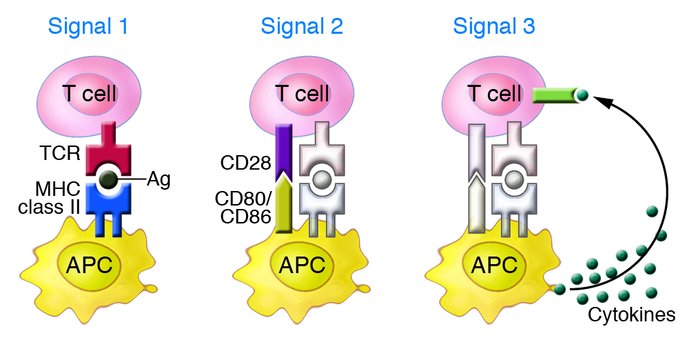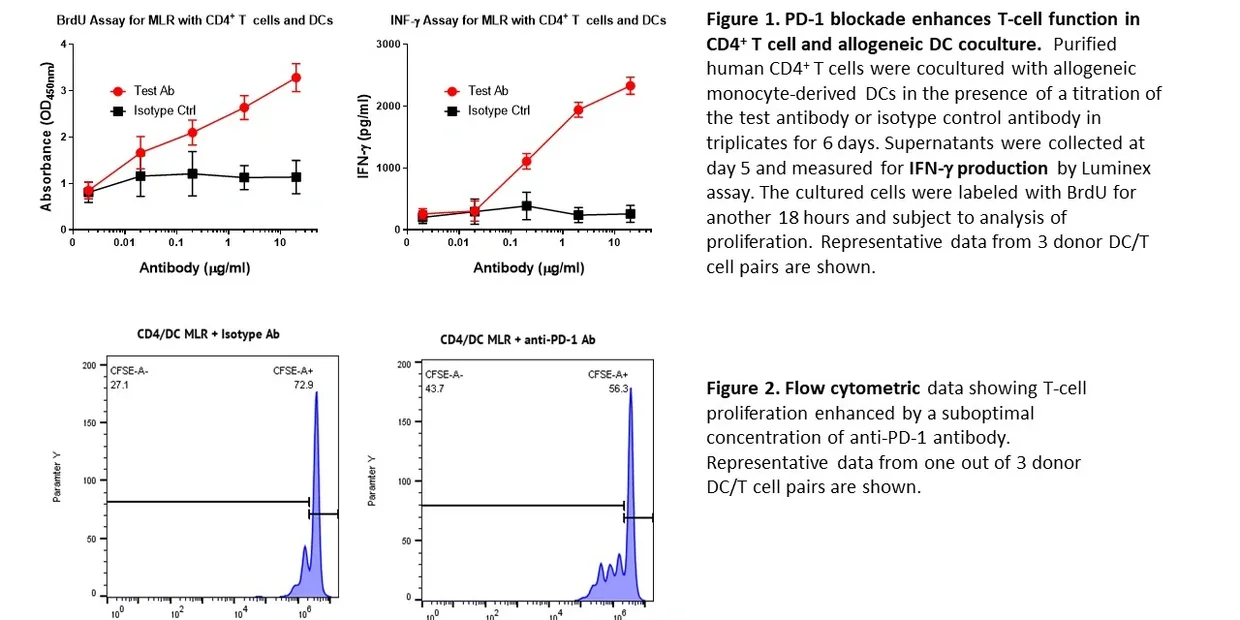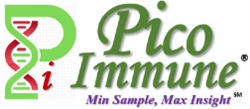Human T Cell Assays
T Lymphocytes
T cells are primarily responsible for cell-mediated immunity. They originate in the bone marrow and mature in the thymus. In the thymus, T cells multiply and differentiate into helper, regulatory, cytotoxic T cells, or memory T cells. They are then sent to peripheral tissues or circulate in the blood or lymphatic system. Once stimulated by the appropriate antigen, helper T cells secrete cytokines, which stimulate the differentiation of B cells. Regulatory T cells act to control immune reactions and cytotoxic T cells, which are activated by various cytokines, bind to and kill infected cells and cancer cells.
Our services include:
- T cell activation and proliferation (MLR, anti-CD3/CD28; PHA/Con A, PMA/ionomycin, SEB, anti-PD1, anti-CTLA4) via high throughput Flow Cytometry and other methods (such as CFSE dilution, BrdU incorporation, and DELFIA)
- Antigen-specific recall response assay
- T-cell Dependent Cellular Cytotoxicity (TDCC) assay for characterization of bispecific T cell engager antibodies (BiTE)
- Target expression profiling on cell subsets (resting and activated)
- Screening for the ability to reverse T cell exhaustion
- CD8+ T cell suppression assay with polarized Treg cells or cytokine-derived CD33+ Myeloid-Derived Suppressor Cells (MDSC)
- Treg Suppression Assay
- Treg Differentiation Assay
- Modulation of differentiation and cytokine profile (from CD4+ to Th1,Th2,Th17, Treg cells)
- T cell migration and chemotaxis transwell assay
Gamma delta (γδ) T cell cytotoxicity assay
T Cell Activation

- Mixed lymphocyte reaction (PBMC/T cell/DC, one way or two-way)
- Immune checkpoint blockade assay
- Cytokine secretion profile (ELISA, Luminex, AlphaLISA, Lumit, or ELISpot)
- T Cell Surface marker expression analysis (flow cytometry)
- IL-2 Stimulation Assay (phospho-Flow, pSTAT5, etc)
- T Cell-Mediated Exhaustion Assay
- T Cell-Mediated Chemotaxis Assay
- Tumor Killing Assays (TKA)
- On/off Target Testing for TCR Cellular Therapeutics
- TAA-specific T Cell Response Assays
- Immune Synapse Formation Assay
- 3D Spheroid T Cell-Mediated Cytotoxicity Assay
Mixed Lymphocyte Reaction (MLR) Assay
About MLR Assay
- The MLR assay is a platform for evaluating compounds that modulate the interaction between antigen-presenting cells (APCs) and T cells, thereby activating, deactivating, or repolarizing lymphocyte cell responses. This assay enables the assessment of immunomodulatory agents' efficacy and provides crucial information on drug safety regarding immunological responsiveness.
- Our MLR Assay facilitates the rapid identification of T cell-modulating agents and is commonly employed to evaluate biologics or small molecules as single agents or in combination in vitro.
- Leveraging our extensive expertise in ultrasensitive and multiplex immunoassays, flow cytometric analysis, as well as knowledge in immunology and oncology, we offer reliable analysis and interpretation of test agent effects on multiple endpoints using various allogeneic donor pairs (e.g., human PBMC/CD3+/CD4+ T/DC cells, mouse splenocytes, etc.).
- One-way MLR is an assay for lymphocyte proliferation, in which responder lymphocytes (such as CD4+ T cells) from one donor are stimulated to proliferate by stimulator lymphocytes from another donor. The stimulator cells (such as allogeneic DCs) are pre-treated with mitomycin-c. Lymphocytes are co-cultured for several days, and the quantification of secreted cytokines (such as IL-2, IFN-g) in cell culture is performed. Bromo-deoxyuridine (BrdU) is introduced into the cell culture to determine the presence of proliferating T cells.
- Two-way MLR differs from a one-way MLR in that both donors of lymphocytes stimulate each other and have the ability to proliferate.
Our Service Features
- High throughput: 96~384-well assay
- Robust and highly reproducible assay suitable for small to large scale screening
- Various applications: Applicable for drug safety, immuno-oncology, and autoimmunity, etc.
- Single agents or combinations: Flexible assay design to fit specific project
- Multiple allogeneic donors: PBMC or enriched primary T cells with various genotypes (such as FcγRIIIa 158 V/V) and monocytes derived dendritic cells (Mo-DCs) from multiple donors to address donor-to-donor variability
- Multiple endpoints: Surface markers, cytokines (such as IL-2, IFN-r), and cell proliferation clearly understand the immuno-modulatory profile of test agents
- State-of-art platforms: Well calibrated and verified Luminex-200 or FlexMAP 3D for multiplex cytokine analysis; CytoFLEX S (Flow cytometer with 4 lasers 13 colors) for cell identification and quantification.
- Quick turn-around time: concise and robust quantitative data in as little as 4 weeks
- Fully validated and quality-controlled
- Multiple concentrations in triplicate
- Positive and negative controls: isotype Ig G, inhibitor and stimulator controls
- Over 20+ years of hands-on experience: Expert data analysis and interpretation, scientific and technical support
- Quality publication-style study report
T Cell Activity Assay Example Data

